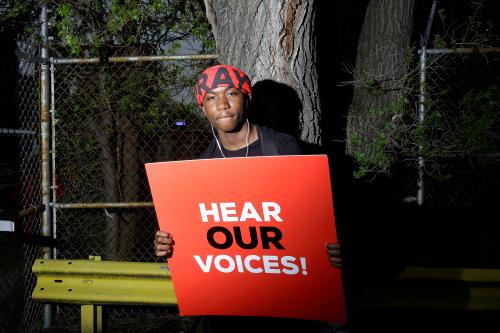A quick perusal of today’s major education organizations, congressional education committees, and research centers will show a rather homogenous picture in terms of race—leadership in education reform is overwhelmingly white. Because of this, some may assume that leaders of color, specifically black leaders and parents, are not actively engaged or invested in education.
However, what we know from decades of research and what we’ve learned at UNCF from working with black leaders for decades, is that representation matters and reform efforts flourish and endure when the intended beneficiaries not only have a seat at the table, but are at the head of that table leading movements. Black leaders and advocates may not only create more inclusive, equity-centered policies, but they also may embolden others to advocate on behalf of all students. Below outlines UNCF’s recent findings from a report about black leaders’ views on education reform and their current engagement in these ongoing efforts.
Done to us, not with us
Far too often we hear conversations and deficit-based statistics about black children, yet the leaders within those communities are not heard in a meaningful way. In fact, our research on black parents showed they felt education reform was being done to them and not with them. Relatedly, over 60 percent of black parents in our survey said that education reform efforts would be more effective if there were more black leaders involved. To that end, we decided to hear from those leaders in “Lift Every Voice and Lead: African American Leaders’ Perceptions of K-12 Education Reform,” the second report in a three-part series highlighting African-American community perspectives on K-12 education. The first report focused on African-American parents, and the third report—which will be released this year—examines African-American youths’ perceptions of education. The impetus of the series is to amplify the voices of the African-American community in both research and practice.
In “Lift Every Voice and Lead,” we surveyed more than 600 influential African-American leaders across the United States, often referred to as “grasstops” to parallel community members at the “grassroots.” These leaders included members of the clergy, along with nonprofit, education, business, and government leaders. Leaders were surveyed in cities with at least 250,000 African-Americans. However, to maximize the number of completed surveys, additional criteria were used, targeting cities with populations of at least 250,000 residents of which at least 15 percent were African-American. The average age range of survey participants was 45-49, and the gender breakdown was 54 percent female and 46 percent male. Additionally, we conducted 36 in-depth phone interviews with African-American leaders.
So what did they tell us?
Though respondents listed education as the second-highest priority in improving their communities, only 3 percent thought that public schools are doing an excellent job preparing African-American students to attend and graduate from college. Specifically, leaders were concerned about the proportion of students performing below grade level, dropping out of school, and being inadequately prepared for college and career.
Beyond having general concerns, we found that leaders were actively engaged in multiple areas in education. Though nearly 80 percent of respondents believed that black leaders in their communities are not doing enough to improve the educational landscape, 59 percent of black leaders talked to members in their community about the importance of improving education; 58 percent mentored students; 36 percent provided educational information to parents or students via workshops; and the qualitative data revealed that many have served on school boards. Interestingly, out of all respondents, members of the clergy exhibited the most optimism and activism in education across a variety of indicators, further indicating the need for collaboration between education advocacy and faith communities.
Black leaders also noted a few ways to improve education, including greater resource equity among schools, access to early childhood education, increased parent engagement, and improved teacher quality. One leader in the study emphasized the significance of teacher quality by highlighting the need for greater cultural competency:
“How can they teach black students or all students well if they don’t know about these students?…We need to provide more education to pre-service teachers and principals on pedagogies that can be used effectively, particularly with African American students.”
While leaders were concerned with teacher quality, they were particularly concerned with the devaluation of educators. They wanted teachers to receive more respect and monetary support. In terms of resource equity, leaders felt that the most disadvantaged schools (which are often schools with predominately African-American students) are in great need of stronger infrastructure and better technology.
The path ahead
The findings of the report demonstrate the need for practical strategies to further engage black leaders in education. Below are a few recommendations.
- Expand community networks. The data from both “Done to Us Not with Us” and “Lift Every Voice and Lead” show that both parents and grasstops understand the salience of collaboration to improve educational outcomes. We urge grasstops to collaborate with parents but also partner with local schools to offer internships and job-shadowing programs. These programs not only benefit students, but provide community leaders with an in-depth view of their local educational landscape.
- Provide leaders with the tools to advocate for African-American youth. Only one in three leaders were confident in their skills to actively make changes in education. We urge nonprofits and other groups to create step-by-step strategies and resources to help leaders stay engaged in education. UNCF will soon release an education advocacy toolkit for grasstop leaders that provides many of the resources leaders requested in the study.
- Champion the message of positive African-American community engagement in education. UNCF released a report a few months ago in conjunction with the National Urban League and Education Post entitled, “Building Better Narratives in Black Education,” suggesting that a new narrative is warranted in education—one that is not solely deficit based, focuses on tangible solutions, and intentionally includes African-American voices in a meaningful way. “Lift Every Voice and Lead” also builds a better narrative that amplifies black leaders’ active engagement in education and persistent optimism to change the state of black education.
- Make the ask. While 96 percent of black grasstops said they were interested in learning more about how to improve education for black students, some leaders simply wanted organizations to ask them to participate in advocacy efforts. Grasstops told us that organizations should approach them with a clear, action-oriented strategy that includes parental involvement and avenues to partner with other organizations. Black leaders are ready to engage in reform efforts, but they would like additional tools and organizations to help them be successful in their endeavors.
With the proliferation of research and discussions around teacher diversity, it’s also important that students see representation across a broad spectrum in education. Black students should know there are leaders who look like them actively advocating on their behalf. The findings of this report further challenge assumptions about black leaders’ advocacy and investment in education within their communities. And we know this investment will create significant dividends in communities for years to come.






Commentary
A seat at the table: Black leaders dissatisfied with the K-12 education system, ready to engage in reform
April 21, 2017